PRESS RELEASES
For more information contact Adam Hunt, Media and Communications Director, Mekong Partnership for the Environment:
MPE PRESS RELEASE 009
Cambodia government and civil society hold landmark public consultations on infrastructure development
28.10.2016 – Phnom Penh, Cambodia
In a landmark move for public participation in Cambodia, the government and civil society jointly held public consultations on regional guidelines to ensure Environmental Impact Assessment (EIA) processes involve affected communities.
More than 100 representatives from private sector companies, communities, civil society organizations, government agencies, environmental impact assessment consulting firms gathered today at a public consultation in Phnom Penh to provide feedback on draft Regional Guidelines on effective Public Participation in Environmental Impact Assessment processes as a way to ensure these processes involve communities.
The participants’ input will help improve an effort that is seen by many as critical for the region to address the environmental and social impacts of the growing array of regional development projects such as dams, mines, power plants, and industrial zones.
“Public participation in decisions related to the design and implementation of infrastructure is not only a good idea, it is also good for the economy,” noted Ms. Sandra Stajka, Director, Food Security and Environment Office, USAID/Cambodia. “It’s important that those who are affected by these decisions are involved in the process.”
As the region experiences a period of rapid economic growth and increasing foreign direct investment in infrastructure projects, the regional environmental impact assessment guidelines are being developed in response to a shared concern about the social and environmental impacts of those projects. Communities and experts throughout the region have been reporting severe negative impacts on natural resources, fish populations, agriculture, community health and culture.
While environmental impact assessment is implemented in all lower Mekong countries, it is often hampered by a lack of effective public participation. This gap can result in adverse social and environmental impacts, project delays, and conflicts with communities, all leading to costs and risks for investors and governments.
“The most important thing is the quality of participation. In these guidelines, we can see participation at all levels, and we want to ensure the quality is strong, especially on issues related to community impacts,” commented Sambo Choun of Indigenous Community Support Organization (ICSO), a Cambodian civil society organization. “Along with government and developers, communities need the power to influence a project.”
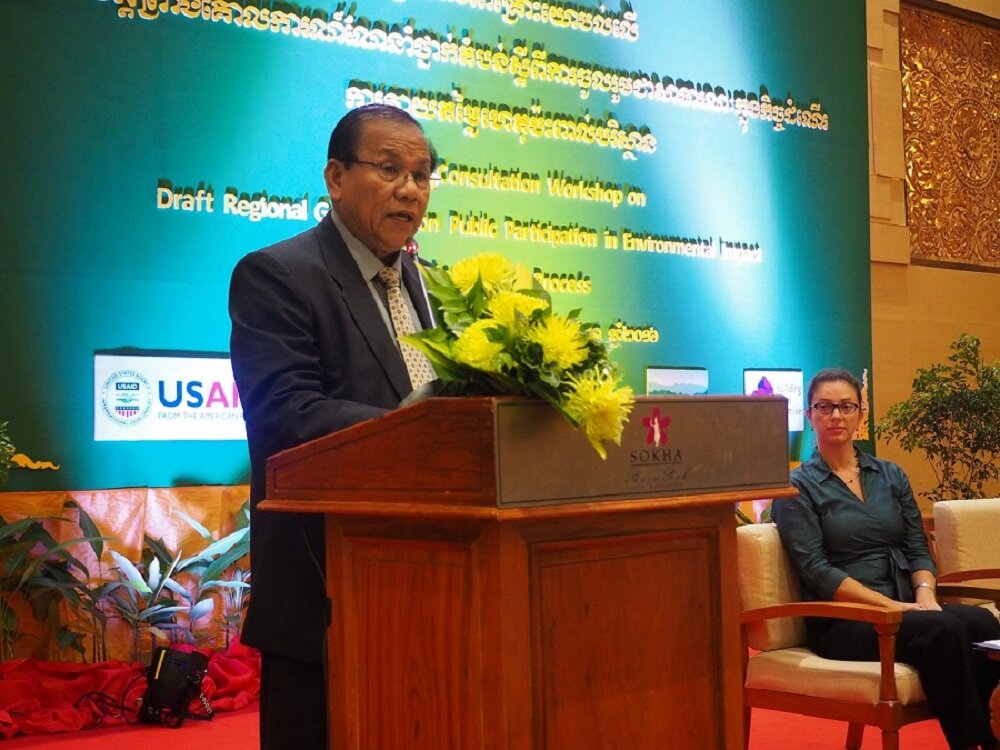
H.E. Sou Souvuth, Undersecretary of State, Ministry of Environment gives opening remarks at the Phnom Penh consultations. (Photo: MPE)
The Regional Guidelines on Public Participation in Environmental Impact Assessment have been drafted by a multi-stakeholder Regional Technical Working Group. Formed in August 2015 with support from the USAID-funded Mekong Partnership for the Environment, the working group includes 25 civil society and government representatives from across the five lower Mekong countries, along with national advisors and technical experts including from the U.S. Environmental Protection Agency and European Union.
Today’s consultation was the final in a series being held across all of the Lower Mekong countries of Cambodia, Lao PDR, Myanmar, Thailand and Vietnam throughout October. The consultations provide investors, environmental impact assessment practitioners, communities, NGOs, government departments and others the opportunity to review and provide feedback on the draft guidelines. The draft guidelines are also available for public feedback via an online platform (mekongcitizen.org/EIA) through October 31.
After the public comment period has closed, the working group will revise the guidelines based on public input received. Once finalized, the work will turn to ensuring these guidelines are implemented by developers and used by governments to complement and improve national policies and practices.
The working group is supported by the USAID-funded Mekong Partnership for the Environment, implemented by Pact in partnership with the Asian Environmental Compliance and Enforcement Network and regional governments and civil society organizations. MPE supports constructive engagement among business, government and civil society to facilitate socially and environmentally responsible development in the Mekong region.
For more information:
See media coverage in English on The Phnom Penh Post
and in Khmer on Radio Free Asia -Khmer, Thmey Thmey, VAYOFM and FAN Khmer
MPE PRESS RELEASE 008
Landmark public consultations on infrastructure development held in Vientiane
24.10.2016 – Vientiane, Lao PDR
A landmark public consultation in Laos on the draft Regional Guidelines on Public Participation in Environmental Impact Assessment (EIA) was held in Vientiane.
More than 100 representatives from private sector companies, communities, non-profit associations, international organizations, government agencies, environmental impact assessment consulting firms gathered today at a public consultation in Vientiane to provide feedback on draft Regional Guidelines on effective Public Participation in Environmental Impact Assessment processes as a way to ensure these processes involve communities.
The participants’ input will help improve an effort that is seen by many as critical for the region to address the environmental and social impacts of the growing array of regional development projects such as dams, mines, power plants, and industrial zones.
“Public participation is at the heart of good development,” said U.S. Embassy Chargé d’Affaires Michael Kleine in support of the regional working group that is drafting the guidelines. “What is powerful about this drafting process is the level of engagement among governments and community partners from around the region.”
As the region experiences a period of rapid economic growth and increasing foreign direct investment in infrastructure projects, the regional environmental impact assessment guidelines are being developed in response to a shared concern about the social and environmental impacts of those projects. Communities and experts throughout the region have been reporting severe negative impacts on natural resources, fish populations, agriculture, community health and culture.

Opening remarks by Dr.Xaynakhone Inthavong, Director General of Department of Planning and Cooperation – Ministry Of Natural Resources and Environment and Michael Kleine, Chargé d’Affaires of the U.S. Embassy to the Lao P.D.R. stressed the importance of Public Participation in EIA. (Photo: MPE)
While environmental impact assessment is implemented in all lower Mekong countries, it is often hampered by a lack of effective public participation. This gap can result in adverse social and environmental impacts, project delays, and conflicts with communities, all leading to costs and risks for investors and governments.
“It is important to have meaningful public participation in the early stage of project development. This helps to identify potential problems and build good relationships with affected communities, which leads to obtaining community support for project operations. As a developer, we do not need only an operating license but also public acceptance. To earn trust from the communities, we need to communicate well with them,” said Mr. Prapard Pan-Aram, Deputy Managing Director – Nam Ngiep 1 Power Company.
The Regional Guidelines on Public Participation in Environmental Impact Assessment have been drafted by a multi-stakeholder Regional Technical Working Group. Formed in August 2015 with support from the USAID-funded Mekong Partnership for the Environment, the working group includes 25 civil society and government representatives from across the five lower Mekong countries, along with national advisors and technical experts including from the U.S. Environmental Protection Agency and European Union.
Today’s consultation was part of a series being held across all of the Lower Mekong countries of Cambodia, Lao PDR, Myanmar, Thailand and Vietnam throughout October. The consultations provide investors, environmental impact assessment practitioners, communities, NGOs, government departments and others the opportunity to review and provide feedback on the draft guidelines. The draft guidelines are also available for public feedback via an online platform (http://eia.mekongcitizen.org) through October 31.
After the public comment period has closed, the working group will revise the guidelines based on public input received. Once finalized, the work will turn to ensuring these guidelines are implemented by developers and used by governments to complement and improve national policies and practices.
The working group is supported by the USAID-funded Mekong Partnership for the Environment, implemented by Pact in partnership with the Asian Environmental Compliance and Enforcement Network and regional governments and civil society organizations. MPE supports constructive engagement among business, government and civil society to facilitate socially and environmentally responsible development in the Mekong region.
For more information:
See media coverage in English on The Laotian Times , Lao News Agency and Asia Pacific Daily.
MPE PRESS RELEASE 007
Myanmar government and civil society hold landmark consultations on public participation in infrastructure development
14.10.2016 – Yangon, Myanmar
Today, representatives from government and civil society jointly held the first–of–its–kind public consultations in Yangon to solicit feedback on draft Regional Guidelines on effective Public Participation in Environmental Impact Assessment processes.
When finalized, the guidelines will help ensure that the voices of local people are heard about large-scale infrastructure development projects, such as dams, mines, power plants, and industrial zones, planned in their communities.
“Public participation in decisions related to the design and implementation of infrastructure is not only just a good idea, but it is also good business,” said Mr. Warren Harrity, Program Office Director at the U.S. Agency for International Development (USAID) Burma Mission. “What we are really talking about is a new way of doing development —one in which all stakeholders are involved in the process.”
Representatives from the private sector, communities, civil society organizations, government agencies and environmental impact assessment consulting firms joined the consultations to discuss the environmental and social impacts of regional infrastructure development.
As the region experiences a period of rapid economic growth and increasing foreign direct investment in infrastructure projects, the regional environmental impact assessment guidelines are being developed in response to a shared concern about the social and environmental impacts of those projects. Communities and experts throughout the region have been reporting negative impacts on natural resources, fish populations, agriculture, community health and culture.
While environmental impact assessment is implemented in all lower Mekong countries, it is often hampered by a lack of effective public participation. This gap can result in adverse social and environmental impacts, project delays, and conflicts with communities, all leading to costs and risks for investors and governments.
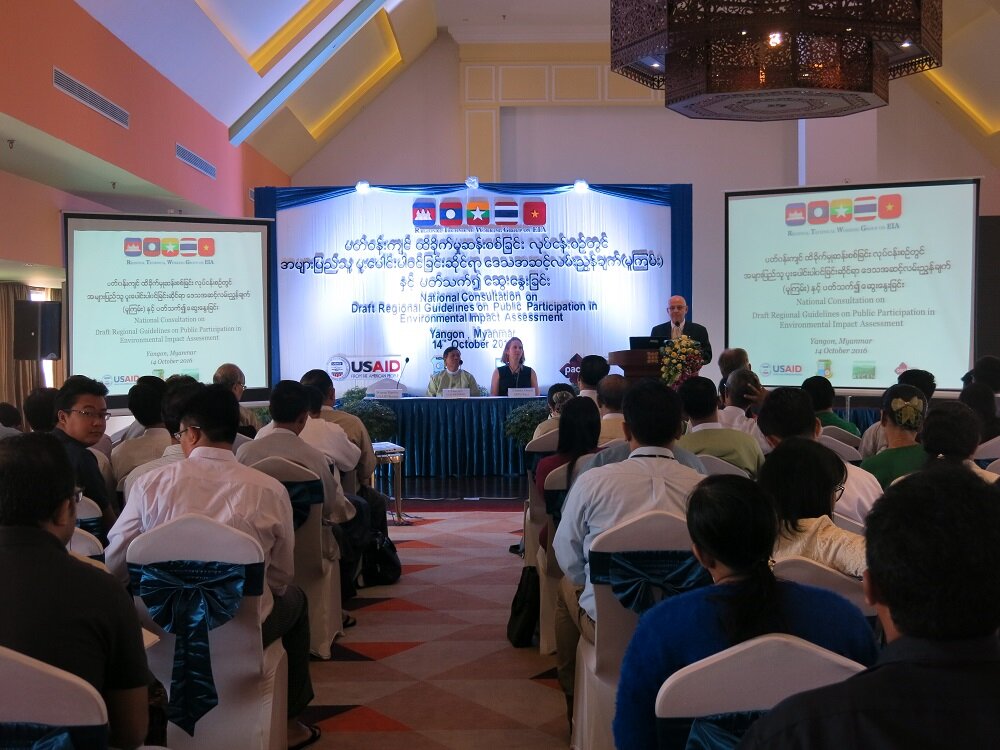
Opening remarks by USAID Burma Mission Program Office Director, Warren Harrity at the Myanmar National Consultation on the draft Regional Guidelines on Public Participation in EIA: Reflections on the importance of Public Participation in EIA process for socially and environmentally responsible development. (Photo: MPE)
“EIA process provides an opportunity for all key stakeholders– government, businesses, and civil society – to come together during the early stages of a proposed project and better development. In Myanmar, we have EIA law and regulations and now we are at the implementation stage. Therefore, multi-stakeholder engagement is very crucial to strengthen regional capacity for sustainable development.”, said Daw Naw Ei Ei Min, Director of Promotion of Indigenous and Nature Together (POINT).
The Regional Guidelines on Public Participation in Environmental Impact Assessment have been drafted by a multi-stakeholder Regional Technical Working Group. Formed in August 2015 with support from the U.S. Agency for International Development (USAID) funded Mekong Partnership for the Environment, the working group includes 25 civil society and government representatives from across the five lower Mekong countries, along with national advisors and technical experts including from the U.S. Environmental Protection Agency and European Union.
Today’s consultation was part of a series being held across all of the Lower Mekong countries of Cambodia, Lao PDR, Myanmar, Thailand and Vietnam throughout October. The consultations provide investors, environmental impact assessment practitioners, communities, NGOs, government departments and others the opportunity to review and provide feedback on the draft guidelines, which are also available for public feedback via an online platform (eia.mekongcitizen.org) through October 31.
After the public comment period has closed, the working group will revise the guidelines based on public input received. Once finalized, the work will turn to ensuring these guidelines are implemented by developers and used by governments to complement and improve national policies and practices.
The working group is supported by the USAID-funded MPE, implemented by Pact in partnership with the Asian Environmental Compliance and Enforcement Network and regional governments and civil society organizations.
For more information:
See media coverage in Burmese on (broadcast news 0.15-0.45 min)
MPE PRESS RELEASE 006
Public Consultations Underway to Improve Environmental Impact Assessment for Infrastructure Development
05.10.2016 – Hanoi, Vietnam
More than 50 representatives from private sector companies, communities, civil society organizations, government agencies, environmental impact assessment (EIA) consulting firms gathered today at a public consultation in Hanoi to provide feedback on draft Regional Guidelines on Public Participation in Environmental Impact Assessment processes as a way to ensure these processes involve affected communities.
The participants’ input will help improve an effort that is seen by many as critical for the region to address the environmental and social impacts of the growing array of regional development projects such as dams, mines, power plants, and industrial zones.
“Public participation is crucial to a quality environmental impact assessment and is at the heart of socially and environmentally responsible development,” said Craig Hart, acting USAID Vietnam Mission Director. “This will help ensure that the social, environmental, and economic aspects of development projects are considered, and contribute to shared and sustainable solutions.”
As the region experiences a period of rapid economic growth and increasing foreign direct investment in infrastructure projects, the regional environmental impact assessment guidelines are being developed in response to a shared concern about the social and environmental impacts of those projects. Communities and experts throughout the region have been reporting severe negative impacts on natural resources, fish populations, agriculture, community health and culture.
While environmental impact assessment is implemented in all lower Mekong countries, it is often hampered by a lack of effective public participation. This gap can result in adverse social and environmental impacts, project delays, and conflicts with communities, all leading to costs and risks for investors and governments.
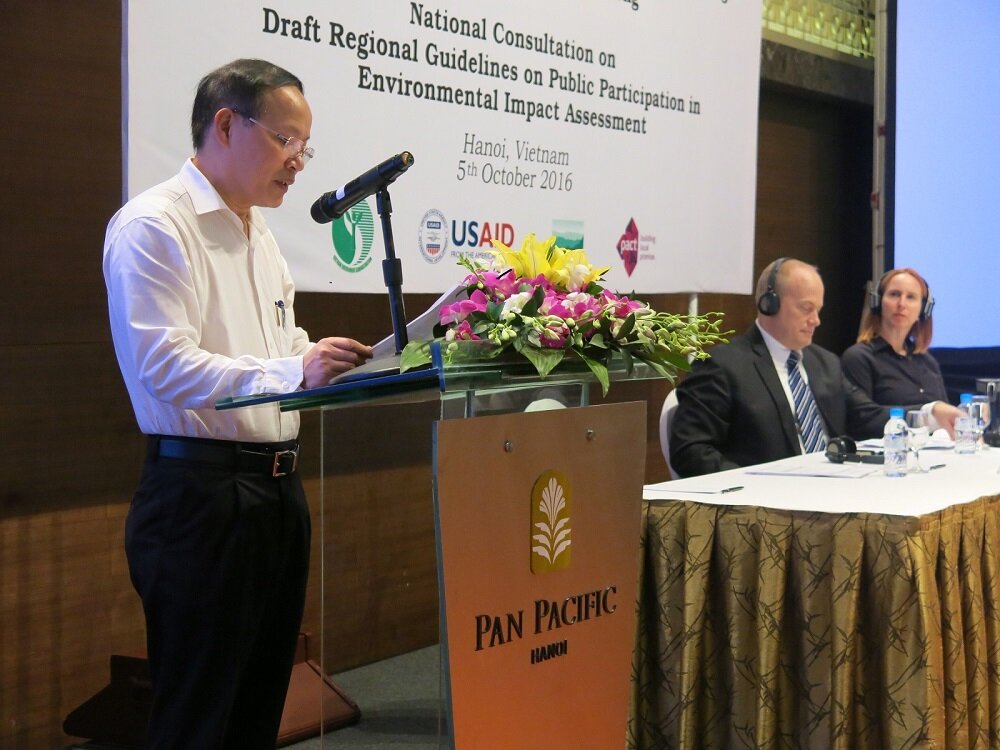
Mr. Nguyen Van Tai, Director General of the Vietnam Environment Administration (VEA) addresses participants at the consultations Photo: MPE
The Regional Guidelines on Public Participation in Environmental Impact Assessment have been drafted by a multi-stakeholder Regional Technical Working Group. Formed in August 2015 with support from the USAID-funded Mekong Partnership for the Environment (MPE), the working group includes 25 civil society and government representatives from across the five lower Mekong countries, along with national advisors and technical experts including from the U.S. Environmental Protection Agency and European Union.
The Guidelines and the group’s participatory drafting process, “set out a good platform for joining the hands of civil society and government, along with private sector input.” said Nguyen Thi Yen of the civil society organization Women’s Intellectual Association of Environmental Protection, who joined the Hanoi consultations. “Public participation is meant to include voices of the public meaningfully throughout the development process. It’s especially important to have guidance to improve the participation of vulnerable groups in EIA processes.”
Today’s consultation was the first of a series to be held across all of the Lower Mekong countries of Cambodia, Lao PDR, Myanmar, Thailand and Vietnam throughout October. The consultations provide investors, environmental impact assessment practitioners, communities, NGOs, government departments and others the opportunity to review and provide feedback on the draft guidelines. The draft guidelines are also available for public feedback via an online platform (mekongcitizen.org/EIA) through October 31.
After the public comment period has closed, the working group will revise the guidelines based on public input received. Once finalized, the work will turn to ensuring these guidelines are implemented by developers and used by governments to complement and improve national policies and practices.
The working group is supported by the USAID-funded Mekong Partnership for the Environment, implemented by Pact in partnership with the Asian Environmental Compliance and Enforcement Network and regional governments and civil society organizations. MPE supports constructive engagement among business, government and civil society to facilitate socially and environmentally responsible development in the Mekong region.
A subsequent public consultation will be organized in Ho Chi Minh City on October 7.
For more information:
Press coverage:
Workshop tackles ethnic issues–Vietnam News
Engaging public participation in environmental impact assessments was advised to offer more chances to ethnic minority groups and to allow underprivileged people to raise their voices, in a consultation workshop held yesterday in Hà Nội. The workshop was organised to receive comments from interested stakeholders for the draft “Regional Guidelines on Public Participation in Environmental Impact Assessments”. The draft is to be compiled by the Regional Technical Working Group with 25 members from both Government and non-government agencies of five countries in the lower Mekong region including Việt Nam, Laos, Cambodia, Myanmar and Thailand.
Vietnam Plus
Tin Moi Truong
In Vietnamese Thien Nhein Net, Hanoi TV, Tin Moi Truong and
MPE PRESS RELEASE 005
Regional NGOs convene in Myanmar to improve community involvement in infrastructure decisions
23.09.2016 – Yangon, Myanmar
This week, 50 representatives from non-governmental organizations (NGOs) across the Mekong region met in Myanmar to share successes and challenges in effectively involving local communities in environmental impact assessment processes.
At the “Community Engagement in Environmental Impact Assessment: A Regional Exchange and Learning Forum” in Yangon, participants explored approaches to helping communities constructively engage with businesses and government to ensure sustainable and equitable development in the context of increasing infrastructure investment in the region.
“Public participation is at the heart of sustainable development,” said Mr. Warren Harrity, Program Office Director at the U.S. Agency for International Development (USAID) Burma Mission. USAID supported the event through its funding for the Mekong Partnership for the Environment (MPE). “Civil society groups have a growing array of success stories in helping communities take part in environmental impact assessment processes. Learning from these will ultimately benefit projects and people across the region.”
As the region experiences a period of rapid economic growth and increasing investment in infrastructure such as dams and power plants, transparent and inclusive environmental impact assessment processes are crucial in protecting communities and the environment.
“There is often a lot of public concern about the environmental impacts of projects such as power plants, as well as the EIA process.” said Ha Thi Hong Hai of the Vietnamese CSO Green Innovation and Development Centre (Green ID), speaking at the event. “We organize events with communities and local authorities to raise awareness of the potential impacts and the legal aspects of the projects.”
Civil Society Organizations (CSOs) can play an important role in ensuring that community perspectives are meaningfully integrated into those formal environmental impact assessment processes.
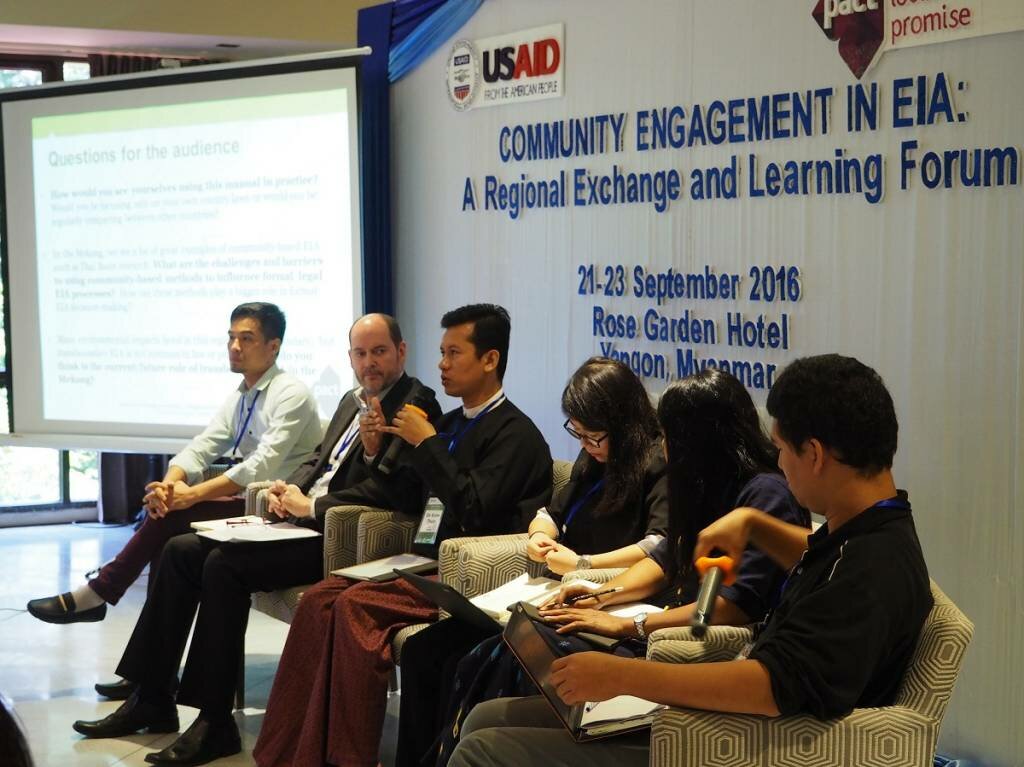
International experts and panelists from Myanmar and across the region discuss how communities can best be involved in Environmental Impact Assessment processes. (Photo: MPE)
“It’s important for civil society to help communities have a voice” said Mr. Menghoin Hok from The NGO Forum on Cambodia. “Communities are the ones most vulnerable and affected by projects. We as CSOs work with and for them to understand their rights, and help them engage with developers, which supports transparency and accountable government, and the rule of law.”
At the forum, participants from Cambodia, Laos, Myanmar, Thailand and Vietnam shared innovative approaches and case studies from across the region of NGOs successfully assisting communities to engage in environmental impact assessment processes for development issues that affect their livelihoods and environment. Participants exchanged practical ideas for incorporating community-based approaches into formal environmental impact assessment processes, examined how to define success and explored how to measure meaningful public participation.
Through dialog and information exchanges at the forum with each other and representatives from the private sector, NGO participants gained an increased understanding of both the environmental impact assessment process and their own role helping communities connect with developers and governments. They also acquired an array of tools, strategies and models to help them achieve their community engagement objectives.
“Most communities affected by investment in Myanmar are indigenous people who don’t know their rights. It was so useful to learn strategies from other countries at the Forum.” said Naw Khin Moe Aye from Promotion of Indigenous and Nature Together (POINT) – a CSO in Myanmar that partners with MPE. “I’m planning for a workshop on EIA next month involving local communities and this event will help me prepare.”
The event was part of MPE’s work supporting constructive engagement among banks, business, government and civil society to facilitate socially and environmentally responsible development in the Mekong region. MPE is facilitating an expert group of regional NGO leaders and government officials to draft Guidelines for Public Participation in environmental impact assessment. The group is holding national consultations throughout the region in October to get feedback on the guidelines.
The USAID-supported regional Mekong Partnership for the Environment project is implemented by the non-governmental organization Pact and its partners.
Press coverage:
Regional NGOs meet in Myanmar to improve community involvement in infrastructure decisions–Mizzima
50 representatives from non-governmental organizations (NGOs) across the Mekong region met in Myanmar to share successes and challenges in effectively involving local communities in environmental impact assessment (EIA) processes. At the “Community Engagement in Environmental Impact Assessment: A Regional Exchange and Learning Forum” in Yangon, participants explored approaches to helping communities constructively engage with businesses and government to ensure sustainable and equitable development in the context of increasing infrastructure investment in the region, according to a press release September 23.
MPE PRESS RELEASE 004
Report Recommends Actions to Increase Cambodia’s Renewable Energy Use
20.01.2016 – Phnom Penh, Cambodia
The Cambodian National Council for Sustainable Development (NCSD), in collaboration with U.S. Agency for International Development (USAID) and its partners, launched a report today that highlights Cambodia’s need to set a formal target for renewable energy generation for sustainable and secure economic growth.
The independent report entitled “Switching On: Cambodia’s Path to Sustainable Energy Security,” supported by the USAID-funded Mekong Partnership for the Environment (MPE) project, recommends that the Cambodian government clarify laws on renewables – such as rooftop solar power – to supply electricity.
With Cambodia’s economy thriving, the authors of the report are optimistic that the country is well placed to diversify its power sources; however, with energy use increasing rapidly, sustainable power sources need to be prioritized.
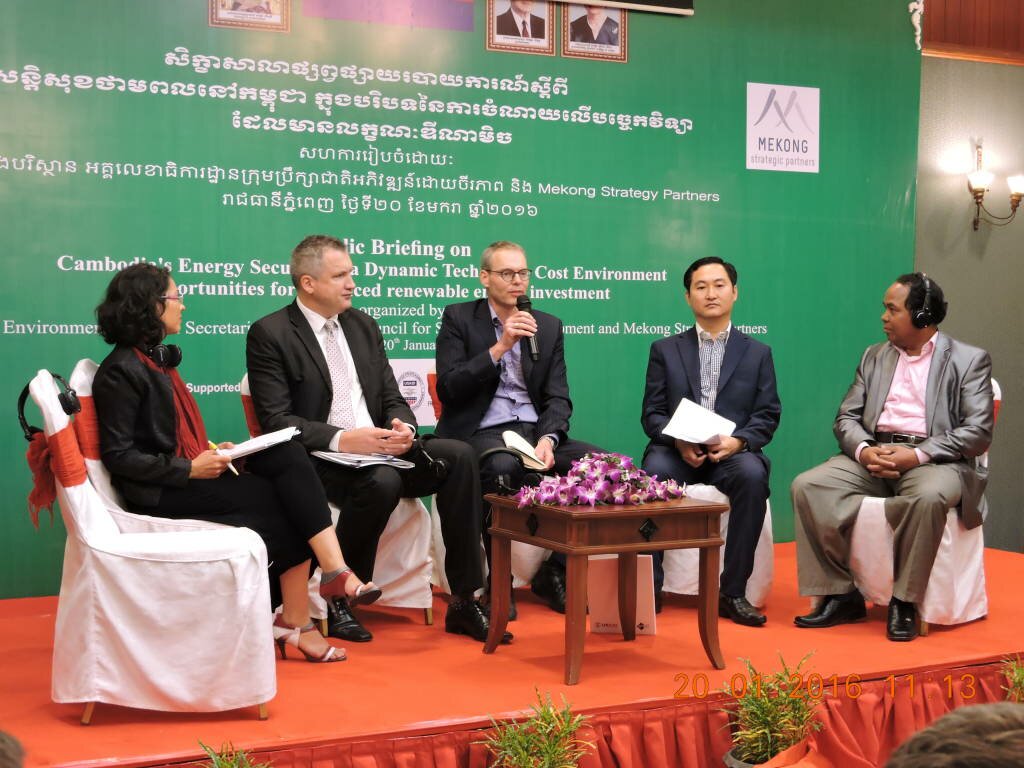
Multi-sector representatives discuss new report “Switching On: Cambodia’s Path to Sustainable Energy Security” and the potential for renewable energy in Cambodia (Photo: Pact Cambodia)
“Meeting these demands in a sustainable way is perhaps the key development challenge facing Cambodia, and the broader region,” said Acting USAID Cambodia Mission Director Sean Callahan, who spoke at the launch. “With falling costs of solar and other renewable energy technologies, these are becoming more cost-effective and competitive with more traditional, centralized power plants such as coal and hydropower.”
Coal and hydropower currently make up about 60 percent of Cambodia’s energy use, while renewables account for less than 1 percent. Coal and hydro projects continue to multiply across the region, but research has shown they can seriously harm communities and food supplies, and contribute to global climate change.
The Cambodian government says boosting renewable power generation is a key goal and they are studying legislative options.
“Now is a particularly good time for Cambodia to be embracing a target and learning to accommodate advanced technologies in its power generation mix,” said Kheiv Mot, Secretary of State for the Ministry of Environment, in remarks at the event. “These technologies and changes will probably arrive sooner than people realise. There are therefore good reasons to start the ‘step by step’ journey to incorporating diverse technologies in the power supply mix.”
According to the report, Cambodia’s priority should be to “formalize an interim renewable energy generation target for Cambodia.” It specifies a potential interim goal of 10 percent of peak energy demand to be generated by renewables by 2020. But it first recommends a detailed study to determine a cost-effective but ambitious level.
“Cambodia’s rapidly growing economy means electricity demand is growing 20% per year. To continue to meet this demand, a great opportunity now exists to take advantage of technologies, such as solar to complement the existing infrastructure.” said report co-author John McGinley, the managing partner of Mekong Strategic Partners. “Recent structural changes in the costs of solar technology now means that Cambodia could produce electricity more cheaply than via traditional conventional methods. And most importantly this supply can be built very quickly to meet the nation’s unfulfilled demand for electricity.”
The report urges the government to establish a system by 2017 to compensate solar power producers for excess energy fed back into the grid.
It also recommends that Cambodia seek international development support from the Green Climate Fund, seek development assistance and training on renewable energy adoption, and consider removing VAT and import duty from solar generation equipment.
The report was supported by a grant to Mekong Strategic Partners through the USAID-funded MPE project, implemented by Pact. The project brings regional working groups of business, civil society and government leaders together to promote best practices and policies on infrastructure development in the Mekong region.
Download the report’s executive summary here.
Press coverage:
Green energy remains untapped –The Phnom Penh Post
Cambodia is overly reliant on developing large-scale hydro and fossil fuel-fired power stations, and should look to diversify its energy generation portfolio through cost-effective non-hydro renewable energy technologies that also offer fewer social and environmental costs, a study released yesterday advised. The report urged authorities to consider more investment in non-hydro renewable energy technologies, which would allow the country to pursue energy security while increasing energy access, reliability and affordability.
Khmer Times
The Cambodia Daily
MPE PRESS RELEASE 003
Mekong Governments, Civil Society Reach Agreement on Environmental Impact Assessment Agenda
15.05.2015 – Hanoi, Vietnam
In a ground-breaking agreement, government officials and civil society representatives from across the Mekong region agreed to establish a working group to develop a regional public participation guideline for Environmental Impact Assessment (EIA), May 14 in Hanoi, Vietnam.
The Regional Technical Working Group for EIA brings together governments, civil society organizations (CSOs), and will expand to cover private sector and EIA experts to improve regional cooperation for effective EIA policy and practices. The group aims to reduce the social and environmental impacts of regional development projects, particularly as the upcoming Association of Southeast Nations (ASEAN) Economic Community further hastens trans-boundary investments.
“This could set an excellent platform and process helping to increase cooperation and dialogue among different stakeholders in social and environmental safeguards,” said Dr. Mai Thanh Dung, Deputy Director of Vietnam Environment Administration, Ministry of Natural Resources and Environment (MoNRE).
CSO and government representatives agreed to establish the working group at the event “Impact Assessment and the ASEAN Economic Community: A Way Forward for Regional Collaboration,” held in Hanoi May 12-13. The workshop was convened by United States Agency for International Development (USAID)-supported Mekong Partnership for the Environment (MPE), in collaboration with Vietnam’s MoNRE and Asian Environmental Compliance and Enforcement Network (AECEN).

Regional EIA experts discuss formation of working group. Photo credit: AECEN
Participants and organizers have collaborated since December 2014 to advance regional EIA work. The establishment of the working group furthers these efforts, toward what participants envision as a regional public participation guideline for EIA to be adopted throughout the region. The guideline is expected to include clear procedures and mechanisms for public participation in development project planning.
“Infrastructure investment decisions in this region are often made without the input of many of the most affected stakeholders,” said USAID Vietnam Mission Director Joakim Parker. “Public participation protocols in EIA processes can help address this trend.”
Over 50 representatives from EIA departments and related ministries, CSOs, and academia from Burma, Cambodia, Laos, Thailand and Vietnam participated in the workshop. The group agreed on an action plan to map their way forward, and will kick off their work by drafting regional guidelines on public participation.
“It is timely to be participating in this regional workshop, along with representatives from Lao PDR’s Department of Environmental and Social Impact Assessment (DESIA) to ensure that our work in Lao PDR is aligned with the regional initiative,” said Dr. Margaret Jones Williams, Environmental Unit Manager, United Nations Development Program (UNDP) in Laos. “Through the Poverty Environment Initiative (we are) supporting Lao PDR in reviewing EIA Guidelines including the public involvement component.”
This is the first formal process teaming regional government and civil society representatives to improve EIAs as a way to address the trans-boundary impacts of investments and development in the Mekong region – and at the ASEAN level.
There is growing awareness in the region that EIA is an important tool. The working group provides an opportunity for practical experience-sharing across the region to inform EIA reforms happening in the region, such as in Burma and Cambodia where they are currently developing new EIA policies.
The group’s Terms of Reference will be distributed widely together with the membership criteria for government and non-government representatives. Selection of RTWG members is occurring July 2015 and will be based on nominees from government agencies and applications from NGOs received by MPE, following a process outlined by attending government and non-government representatives at the Hanoi workshop.
The kickoff Regional Technical Working Group on EIA meeting is set for September in Thailand.
Press coverage:
Mekong nations set up group for environmental impact assessments –The Nation
Government officials and civil society representatives from across the Mekong region have agreed to establish a working group to develop a regional public participation guideline for Environmental Impact Assessment (EIA). The Mekong Regional Technical Working Group for EIA brings together governments, civil society organizations (CSOs), and will expand to cover private sector and EIA experts to improve regional cooperation for effective EIA policy and practices
Prachatai
The Cambodia Herald
MPE PRESS RELEASE 002
Civil society and private sector work toward profitable, responsible investment
25.03.2015 – Phnom Penh, Cambodia
In March, regional businesses, financial institutions and civil society organizations from across the Mekong region met to strategize about increasing the use of responsible investment strategies, which reduce risk, save money and improve their reputations.
Over 40 representatives from the private sector and civil society in Cambodia, Laos, Myanmar, Thailand and Vietnam participated in the “Business Case for Integrating Environmental, Social and Governance Factors in Investments” workshop in Phnom Penh, Cambodia, on March 24 and 25. Participants learned about the emerging trends and alternatives in sustainable investment and shared strategies on how they can apply environmental and social risk management.
“It is important to integrate social and environmental considerations into investment projects and engage with diverse stakeholders and communities,” said USAID Cambodia Mission Director Rebecca Black. “This is important not because it not only makes good sense for development, but also makes good sense for business.”
The workshop was co-organized by the USAID-supported projects Mekong Partnership for the Environment (MPE) and the Private Financing Advisory Network (PFAN-Asia).
The event included networking opportunities with industry leaders to share experiences in integrating environmental, social and governance (ESG) factors into their core business strategies.
“If companies comply with ESG principles, it will help to protect both companies and communities from negative environmental impacts and unnecessary losses.” said Herbert Jaeger, Vice President of the German Investment and Development Company. “It will also help companies to establish stable relationships with customers and communities.”
The workshop also brought together private sector and civil society representatives to discuss ways to reduce the environmental and social risks of investment projects and ensure sustainable investment.
“All key stakeholders – private sector, government and communities – play important contributing roles to ensure a sustainable environment,” said Mam Sambath, Executive Director of the civil society group Development and Partnership in Action, Cambodia. “To include ESG in investment is very important and we will all need to work together.”
The event is part of MPE’s efforts to enhance responsible investment in the Mekong region. MPE – which is implemented by international NGO Pact – is facilitating regional working groups of business, civil society and government leaders to promote best practices and policies for effective impact assessment in the region.
USAID PFAN-Asia is a five-year regional program implemented by Deloitte Consulting LLP. The program aims to mobilize $1 billion of investment in renewable energy generation projects, energy efficiency programs and clean transportation projects to avoid or reduce greenhouse gas emissions.
MPE PRESS RELEASE 001
Government and civil society support strong Environmental Impact Assessments
03.12.2014 – Bangkok, Thailand
Government and civil society representatives highlighted the need for strong and inclusive environmental impact assessment (EIA) policies and practices in the Mekong region at a meeting this week in Bangkok, Thailand.
Organized by the United States Agency for International Development (USAID) -supported Mekong Partnership for the Environment (MPE) project and the Asian Environmental Compliance and Enforcement Network (AECEN), the December 1-3 event, “Environmental Impact Assessment Policy and Practice in the Mekong Region: Safeguarding Sustainable Development,” brought together more than 50 government and civil society representatives from across the region. Participants discussed ways in which EIAs can better protect communities and the environment from harm due to poorly planned projects.
“The pace of development in the Mekong region is remarkably fast,” said MPE Director Christy Owen. “It’s crucial for all parties – governments, citizen groups, the private sector – to come together for the sake of communities and the environment.”
Representatives from governments and civil society organizations from Cambodia, Laos, Myanmar, Thailand and Vietnam agreed that public participation in the EIA process is critical for large-scale development projects such as hydro-power dams, mines, ports and industrial zones. Civil society participation is a best practice around the world. For example, consulting civil society is a core and required part of the U.S. government’s EIA process that results in better projects.
“If we involve affected communities, we can help avoid conflicts,” said Nop Virak of Vishnu Law Group, a civil society organization working with the Cambodian government on their new EIA law. “Whoever is doing the EIA needs to go speak to the communities. It’s impossible to do everything from our desks.”
An official from the United States Environmental Protection Agency (EPA) also participated in the event. The EPA urged participants to continue to improve laws and practices, and offered to share best practices and lessons learnt from U.S. development experiences.
“EIA processes have incredible potential for identifying and resolving issues,” said EPA official Davis Jones. “The more you can involve stakeholders early and throughout, the better the project.”
MPE aims to build off of the event’s momentum by facilitating further dialog toward a shared action plan for promoting a regional EIA standard and responsible business and investment practices.
Throughout the Mekong region, there is a wave of reform efforts related to EIA policy, including a new draft EIA law in Cambodia and a Vietnamese environmental protection law set to take effect in early 2015. These reforms, along with the launch of the ASEAN Economic Community (AEC) next year, are revealing new opportunities to improve EIA policy and practice and address the increasingly regional impacts of investments.
“We’re entering AEC soon. All our countries have our own legislation, but in practice, we each have challenges,” said Indhira Euamonlachat, a participant from the Thai Office of Natural Resources and Environmental Policy and Planning (ONEP). “This (EIA) event is a good chance to look for cooperation between governments – and also civil society.”
Mekong Partnership for the Environment is a four-year, USAID-funded project implemented by the non-governmental organization Pact. MPE supports constructive engagement among governments, business and civil society to promote socially and environmentally responsible development in the Mekong region.
Press Release – MPE EIA Dec 1-3 Bangkok
Press coverage:
Government and civil society support strong Environmental Impact Assessments – Transborder News
Mekong Partnership for the Environment gathers regional experts to discuss public participation in EIAs







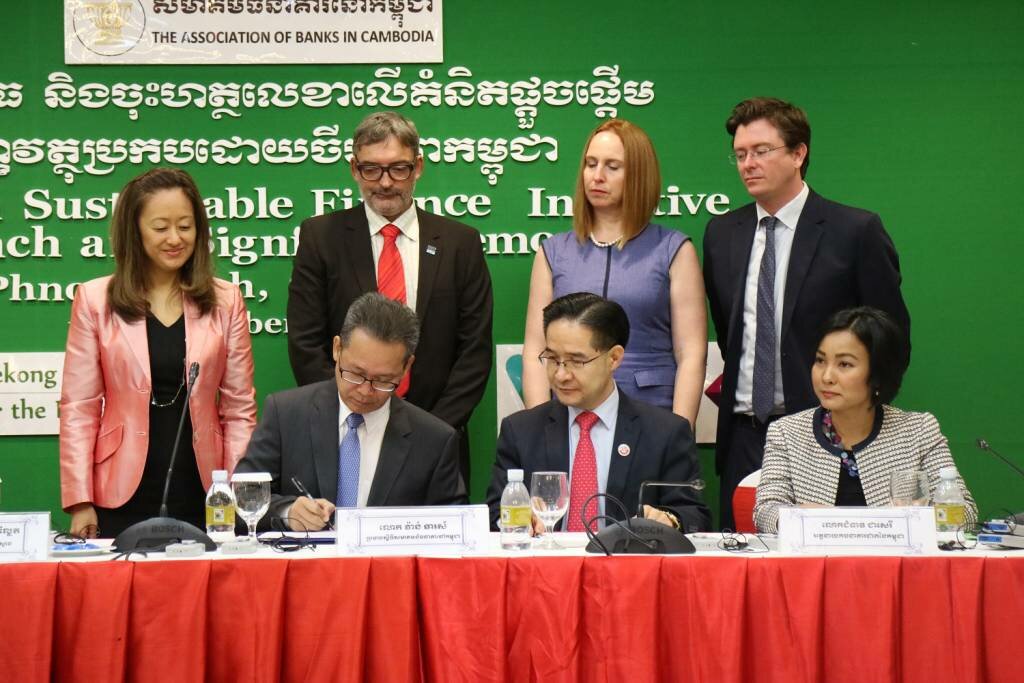









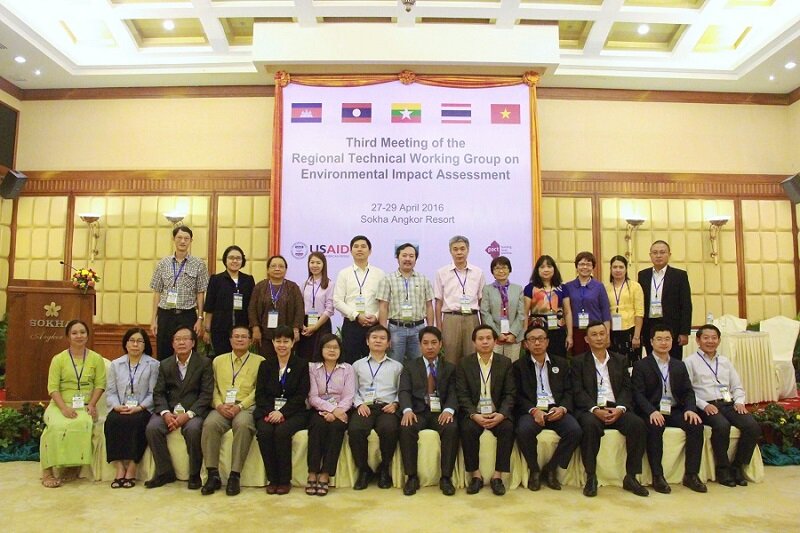 Group photo of the RTWG on EIA members at the 3rd meeting of the group in Siem Reap, Cambodia, Photo: AECEN
Group photo of the RTWG on EIA members at the 3rd meeting of the group in Siem Reap, Cambodia, Photo: AECEN




